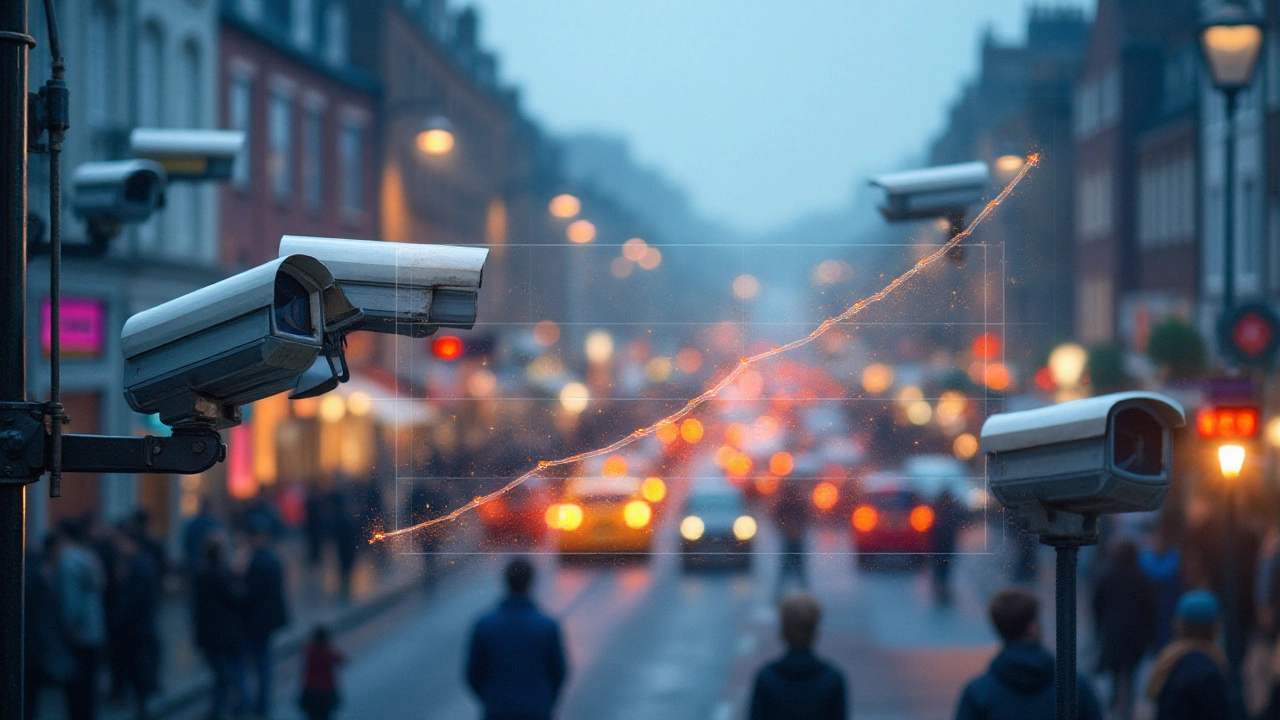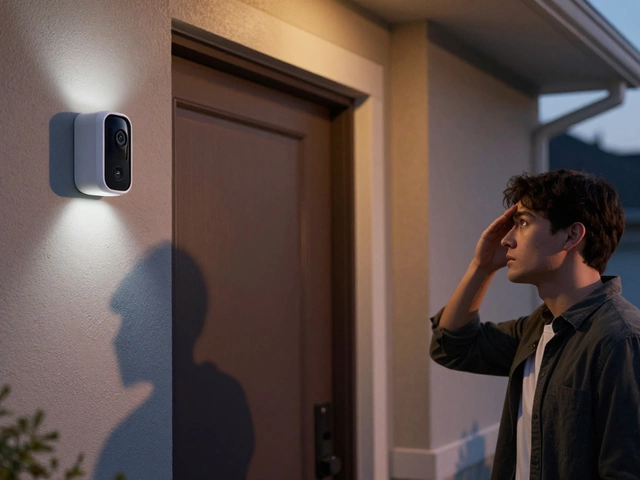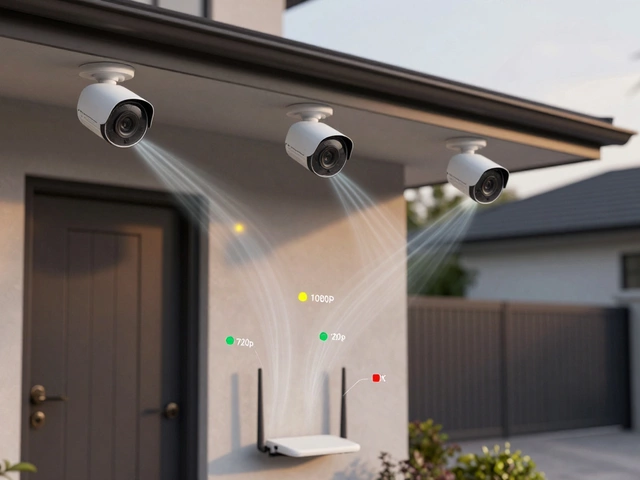CCTV installation is a crucial aspect of modern security systems, geared towards both residential and commercial applications. Within this industry, certain roles offer notably higher earning potentials. As technology continues to evolve, the landscape of CCTV installation grows alongside it, bringing about new opportunities and challenges.
Understanding which specific roles yield the most lucrative returns can help professionals navigate their career paths more strategically. Some positions, due to the technical expertise required or due to specific demands in high-risk areas, naturally command higher salaries. Exploring these can provide valuable insight for those considering a career in the security field.
Join us as we break down the various roles involved in CCTV installation, look into which operator roles reap the most financial benefits, and consider what it takes to secure such positions. We will also cover essential skills and certifications that can enhance earning potential and explore future trends in the security industry to anticipate emerging opportunities.
- Diverse Roles in CCTV Installation
- Top Earning Operators and Roles
- Skills and Certifications for High Earnings
- Trends and Future Opportunities
Diverse Roles in CCTV Installation
In the ever-expanding world of CCTV installation, a variety of roles cater to different skill levels and interests, making it a dynamic career path. These roles cater not only to the technical and mechanical aspects but also to project management, sales, and customer support. Each role comes with its unique set of responsibilities, contributing to the comprehensive provision of security solutions. At the core of the installation process is the Technician, who is responsible for setting up and maintaining the equipment. Technicians are generally at the forefront, diagnosing problems, ensuring connectivity, and making sure that systems operate smoothly. Their work is crucial because proper installation determines the reliability and efficiency of the surveillance system. Typically, they need hands-on skills and must keep abreast of technological advancements in security systems to ensure optimal operation. System Engineers, who hold more specialized roles, focus on the backend aspects. They are involved in the design, integration, and technical configuration of complex CCTV systems. Their knowledge of software and hardware systems allows them to tailor systems to meet client-specific needs, proving their indispensable role in personalizing security solutions.
Another critical role is that of Security Consultants. They assess the needs of clients and design custom CCTV solutions, ensuring that every potential security loophole is covered. Their work often lays the foundation for installation teams, as they draft the initial plans and suggest the most effective technologies to employ. Additionally, consultants must stay ahead of market trends and existing threats to provide forward-thinking strategies to clients. This often makes the consultant role one of the highest-earning positions in the sector, owing to the strategic thinking and expertise required. Project Managers oversee the execution of multiple installations and ensure that projects are completed on time and within budget. Their role requires a blend of managerial skills and technical understanding, having to coordinate between teams while addressing unexpected challenges that arise during installations. By balancing resources, timelines, and client expectations, they play a pivotal role in maintaining client satisfaction and quality delivery.
Sales and customer service representatives often serve as the public face of CCTV businesses. Sales roles require individuals to be knowledgeable about product specifications and industry developments. They must effectively communicate the benefits of various CCTV systems to clients, negotiating deals that are beneficial for the company while meeting customer needs. Meanwhile, customer service representatives offer technical support and guidance post-installation, solving client issues and ensuring that the systems continue to meet user expectations. According to recent data, roles that require a combination of technical and soft skills tend to see growth in demand. A table illustrating average earnings across roles could present insights into the compensation landscape of the industry.
"Venturing into the field of CCTV installation not only requires technical knowledge but also an understanding of human behavior," notes security expert John Brigham.
As the world leans increasingly towards tech-based solutions for security, the roles within CCTV installation see constant evolution. There's an increasing demand for IT specialists who can handle more than just installation, encompassing network security and data integrity as crucial aspects of the job. Each role, whether frontline or behind the scenes, contributes significantly to the efficient delivery of security services.

Top Earning Operators and Roles
In the bustling world of CCTV installation, determining which operators and roles offer the highest earning potential is key to carving out a successful and financially rewarding career. The landscape is dominated by various positions, each with unique responsibilities and opportunities. The most lucrative roles often require a blend of technical prowess, managerial expertise, and an understanding of evolving technologies.
Technical leaders, such as system architects and deployment strategists, often top the earnings chart. These individuals not only oversee the design and implementation of complex security systems but also ensure they meet the specific needs of businesses and homeowners. Their roles require both creativity and precision, as they are tasked with integrating cutting-edge technology to create robust and reliable systems. As smart technology becomes more interwoven with security solutions, these experts find their skills increasingly in demand and well-rewarded financially.
Another high-paying role is that of the project manager in large-scale installations. These professionals coordinate various aspects of the installation process, ensuring that projects are completed on time and within budget. Given the significant capital investments often involved in major security infractions, these managers must possess exceptional organizational skills and an intimate knowledge of the security industry. Their knack for balancing execution with client satisfaction makes them invaluable assets to companies, translating into hefty paychecks.
Lead technicians and senior specialists often command impressive salaries as well. With years of hands-on experience, these professionals provide critical insights into troubleshooting and upgrades. Their ability to stay abreast of new advancements and to train junior staff makes them versatile and essential to any installation team. As the market trends shift towards increased online surveillance systems and AI-driven analytics, the demand and remuneration for such skilled operators will likely rise.
"The security sector has evolved dramatically, and those who marry a depth of technical knowledge with the ability to manage intricate systems are the ones leading the pack," states Jonathan Reeves, a renowned industry analyst from Security Hardware Insights.
Finally, sales engineers that specialize in CCTV technology find themselves well-positioned in terms of financial gain. These professionals bridge the gap between the technical capabilities of products and the customer's needs, essentially functioning as both engineers and salespersons. Their in-depth understanding of CCTV installation and the confidence to sell complex systems make their roles highly lucrative. As businesses strive to stay protected, the expert advice of a sales engineer proves invaluable, driving up their market value.
The lucrative positions within the CCTV installation industry are numerous and varied, offering opportunities for technical experts, project leaders, and strategic sales professionals alike. By focusing on acquiring specialized skills and staying updated on industry trends, individuals can position themselves in roles that not only meet their professional aspirations but provide substantial financial rewards.

Skills and Certifications for High Earnings
In the ever-evolving world of CCTV installation, aligning your skillset with industry demands can significantly boost your earning potential. At the heart of this prosperous field lies a blend of technical prowess and practical knowledge. One of the most influential factors driving high salaries is expertise in cutting-edge technology and advanced systems. Installers proficient in network-based systems rather than traditional analog systems are more sought after, as the demand for complex technological solutions continues to rise. Networking and IP configurations, for example, are essential skills for those engaging with modern surveillance setups.
Being certified can also open doors to higher pay scales. For instance, certifications such as the Electronic Security Association (ESA) certification or the International Security Management and Crime Prevention Institute (ISMCPI) certification often serve as benchmarks for employers in the industry. These certifications vouch for an individual's capability in handling intricate systems with safety and efficiency, thereby elevating their professional standing. Another pivotal credential is the NICET Certification (National Institute for Certification in Engineering Technologies), which is valued across the engineering and technological fields, offering specialists avenues into more challenging and rewarding job roles.
The Security Industry Association (SIA) notes that "the demand for skilled technicians who can integrate and troubleshoot complex systems is at an all-time high, commanding competitive salaries in the market."
In addition to these, practical skills such as project management, customer service, and problem-solving are crucial. Understanding customer needs and tailoring solutions accordingly can lead to client satisfaction and additional business through referrals. Effective communication and project management skills also ensure projects stay on track and within budget, which is invaluable to employers looking to maintain operational efficiency and client trust. Pairing these soft skills with technical capabilities establishes a balanced skill set attractive to potential employers.
Pioneering Advanced Skills
In this digital age, expertise in emerging technologies like cloud surveillance systems and AI-powered analytics is becoming increasingly beneficial. Tech-savvy installers who can offer insights into data-driven security solutions are positioning themselves at the forefront of industry innovation. For instance, the integration of artificial intelligence and machine learning into CCTV systems, enabling real-time analytics and predictive maintenance, is a skillset that comes with hefty salary increments.
To stay updated, professionals in this field often pursue continuous education programs and attend industry seminars or workshops. These events not only expand knowledge but also provide networking opportunities with industry leaders and peers. It's these interactions that sometimes lead to unexpected career opportunities and partnerships, greatly impacting both professional growth and earning possibilities.
From developing comprehensive technical skills to acquiring valued certifications, the pathway to achieving the most lucrative positions in the security industry is grounded in a commitment to learning and adaptation. As technology continues to reshape security solutions, those who embrace these changes and proactively hone their skills are better poised to capitalize on the financial opportunities within the realm of CCTV installation.

Trends and Future Opportunities
The world of CCTV installation is continuously evolving, with technology advancements shaping the future in exciting ways. One major trend is the integration of Artificial Intelligence (AI) and machine learning into surveillance systems. This not only enhances the efficacy of security measures but also alters the landscape for industry professionals. AI-enabled cameras can now identify unusual behavior patterns and trigger alerts, minimizing false alarms, which means that operators skilled in AI and data analysis are increasingly in demand. This shift points towards a future where the skill set required for top-earning roles in CCTV will include a robust understanding of advanced technologies.
Another significant trend is the growth of smart home technologies, which is driving demand for integrated security systems. Consumers prefer centralized control over all security features, integrating CCTV with other home automation systems. The Internet of Things (IoT) is crucial here; it creates opportunities for professionals who can design and implement interconnected systems that provide seamless security solutions. Being knowledgeable about network configurations and IoT connectivity could be a gateway to maximizing earnings in this field.
According to a report by MarketsandMarkets, "The smart home market is expected to grow from $78.3 billion in 2020 to $135.3 billion by 2025, at a CAGR of 12%." This highlights the lucrative potential for CCTV installers who can specialize in smart home integrations.
The rise of cybersecurity threats also casts its shadow over the physical security landscape, necessitating enhanced protection of CCTV systems against hacks. Security professionals who can offer solutions that ensure the integrity of surveillance data will find themselves with ample opportunities to capitalize financially. In addition to hardware installation skills, knowledge about cyber threats and defensive protocols are becoming indispensable in high-paying roles.
Geographically, regions with heightened security needs, such as urban commercial hubs or areas with higher crime rates, continue to offer exceptional financial prospects for CCTV operators. There is a growing trend towards deploying high-resolution cameras and systems capable of facial recognition, indicating that proficiency with these technologies can offer a distinct edge. Earning potential is often highest in these areas, as businesses and institutions seek top-notch security solutions.
Looking into the future, the industry's trajectory indicates a steady increase in demand for security systems, driven by both technological advancements and societal needs for enhanced safety. This presents a promising outlook for those considering entering or advancing within the industry. Keeping a finger on the pulse of emerging technologies, cultivating new skills, and staying adaptable will position professionals superbly to benefit from these future opportunities.



